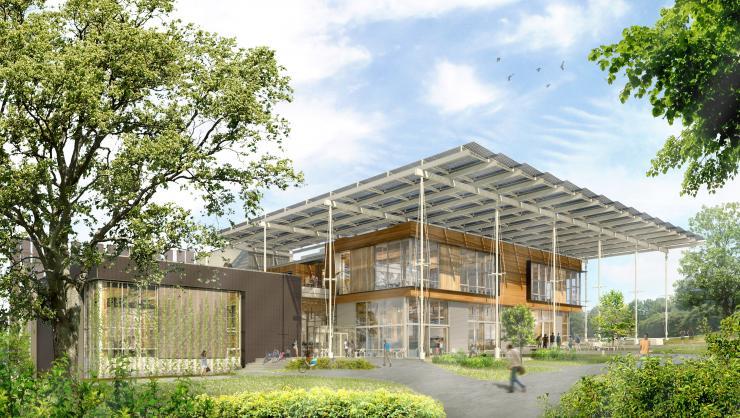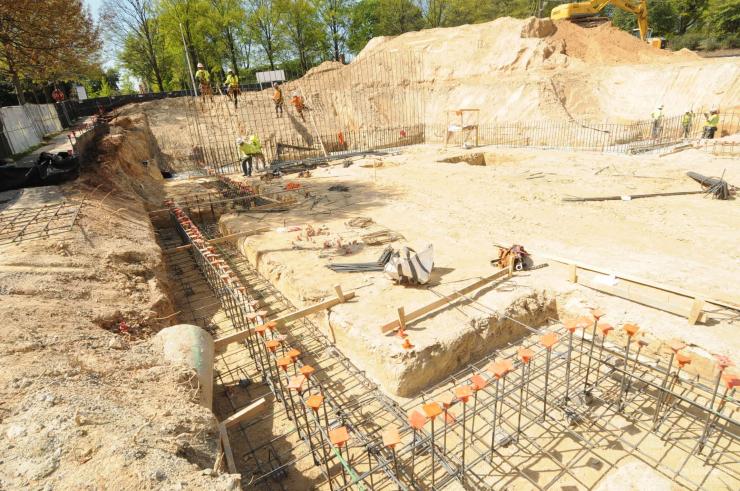Taking Shape: The Kendeda Building for Innovative Sustainable Design
Apr 18, 2018 — Atlanta, GA

This perspective demonstrates how the Living Building's "porch" integrates the building with the Eco-Commons to the west.
Image courtesy of The Miller Hull Partnership in collaboration with Lord Aeck Sargent.
The earth is finally beginning to make way for The Kendeda Building for Innovative Sustainable Design. Earlier this year, what used to be a parking lot at the corner of Ferst Drive and State Street began its transformation to bigger and better things; once completed, The Kendeda Building is expected to become the most environmentally advanced education and research facility in the Southeast.
“Seeing the fencing go up and the grading equipment roll in was a major milestone,” said John DuConge, senior project manager for Facilities Management. “Given the very unique requirements of The Kendeda Building, we knew we would spend a considerable amount of time on the front end designing and planning this project with our project partners: Lord Aeck Sargent and their team of consultants.”
DuConge added that the building is expected to come together rather quickly, with the goal of substantial completion by May 2019. Move-in activities along with the operational ramp-up is expected to commence that summer in preparation for the start of fall semester classes in August.
Site work is scheduled through April to prepare for constructing the basement level, which includes the project’s 45,000-gallon cistern — a key element of the net-positive water requirement. After the foundation is set later this spring, the steel and wood structures will be put in place, giving the building its framework. Other visible installations will include the more than 900 photovoltaic panels that will be installed later this fall and winter.
More Than Just Construction
But designing and constructing the building is really only one aspect of achieving Living Building Challenge 3.1 full certification. Operating and maintaining the building are critical factors, too. So, selecting the appropriate occupants to properly steward the Challenge principles and abide by the strict building operating requirements is equally important.
“The Kendeda Building will be one of only a few Living Building Challenge-certified facilities that will serve such a large group of occupants on a daily basis,” said Michael Gamble, director of Graduate Studies and associate professor for the School of Architecture. “Everyone in the building, including students, staff, and faculty, is responsible for complementing and upholding the basic building principles in how we learn and teach.”
One of The Kendeda Building’s featured programs includes the Global Change Program, which officially launched in March. This new initiative aims to coordinate and grow educational and research activities focused on providing solutions and creating economic opportunities at the intersection of global change, climate change, and energy. The program will be directed by Kim Cobb, ADVANCE professor and Georgia Power Chair in the School of Earth and Atmospheric Sciences. Early program activities will focus on curriculum design for undergraduates, including creation of an “Energy and Climate” minor and a climate solutions lab.
Gamble further explained that the College of Sciences will take the lead on utilizing the class labs for several core courses (including general ecology), which serve a broad cohort of students. As such, the instructors are refining their teaching methodologies in the labs to accommodate water and energy use requirements.
Along with the College of Sciences, courses from a number of colleges will also be offered in the building including English 1101 and 1102, advanced energy modeling, and vertically integrated projects. In addition, capstone teams will also have space in The Kendeda Building.
As the instructional programming is being developed for when the building opens in Summer 2019, several learning opportunities are already taking place. Last year, the Academic and Research Council announced a campuswide call for proposals for research, teaching, and community-based pilot ventures connected to The Kendeda Building and the Living Building Challenge. Currently, six interdisciplinary research projects are underway:
- Workflows and Data Modeling in Support of the Material Sourcing Requirement of the Living Building Challenge - School of Architecture and Digital Design Lab.
- Living Building Equity Champions - Office of Institute Diversity.
- Biologically Inspired Sustainable Building Design Challenges for Middle School Engineers: Expanding the Educational Reach of the Living Building at Georgia Tech - CEISMC and Center for Biologically Inspired Design.
- Documenting the Effects of the Living Building on Biological Diversity and Succession - School of Biological Sciences.
- Pilot Project Proposal for Living Building Monitoring Systems - Brooks Byers Institute for Sustainable Systems and School of Earth and Atmospheric Sciences.
- Living Building Community Crowdsourcing: Developing an Interactive Augmented Reality Viewer to Capture Community Feedback - School of Civil and Environmental Engineering.
As these inaugural pilot projects conclude later this year, the Academic and Research Council is working to organize a second round of pilot programs focused on energy. The goal will be to support faculty- and student-led teams in developing innovative and creative solutions that could help address strict energy requirements such as the Living Building Challenge’s net-positive energy standard.
For more information, visit LivingBuilding.gatech.edu and livingbuilding.kendedafund.org.

The northwest corner of Ferst Drive and State Street is beginning its transformation. Workers are establishing the building footprint by preparing for the concrete foundations (i.e. the footings) and the concrete walls of the building's basement level.
Rachael Pocklington
Institute Communications




